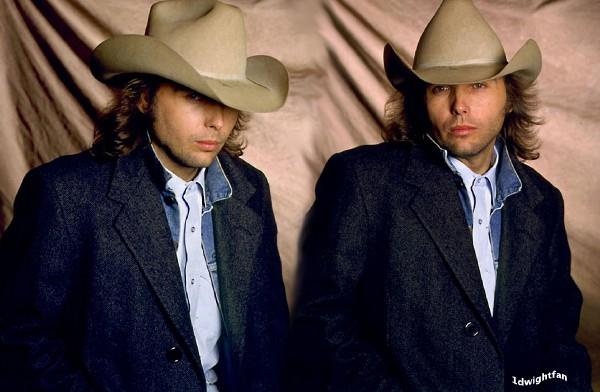
A porch light left on for no one—“I Hear You Knockin’” is Dwight Yoakam turning a swamp-blues refusal into a honky-tonk vow to keep the door shut, even when memory rattles the latch.
Key facts first. “I Hear You Knockin’” sits mid-sequence on Buenas Noches from a Lonely Room (released August 2, 1988). It was not issued as a single, so there’s no chart peak for the track itself; instead the album carried the commercial story—No. 1 on Billboard’s Top Country Albums and No. 68 on the Billboard 200—while its A-sides “Streets of Bakersfield” and “I Sang Dixie” both reached No. 1, with “I Got You” peaking at No. 5. On most editions, “I Hear You Knockin’” runs about 3:12–3:16.
Here’s the lineage that matters. Yoakam’s cut isn’t the 1955 New Orleans R&B hit later made famous by Dave Edmunds; it’s a different song with the same title—the Louisiana swamp-blues tune written by J.D. Miller and first recorded by Lazy Lester in 1958/59. Yoakam keeps Miller’s tough premise—I hear you calling, but it’s no use—and relocates it to his own hardpan terrain. That choice nods to the borderland where his music lives: California Bakersfield snap with a Gulf-coast shadow flickering at the edges.
Sonically, the record is a small masterclass in restraint. Producer-guitarist Pete Anderson frames the performance with Yoakam’s familiar grammar—dry drums, spare bass movement, bright Telecaster figures, and enough steel and room tone to let the vocal sit forward without grandstanding. It’s the kind of clean, unfussy sound the team favored at Capitol Studios in Hollywood: modern clarity in service of an old truth, the band leaving air for the story to breathe. The result feels lived-in rather than lacquered—three minutes that move like good boots on a wooden floor.
If you came of age with this album, you’ll remember how Buenas Noches from a Lonely Room carried two headlines at once: the radio triumph of those No. 1 singles, and the darker arc of the LP itself—jealousy, breakup, violence, and a late turn toward prayer. In that sequence, “I Hear You Knockin’” acts like a pivot. It isn’t melodramatic; it’s diagnostic. The narrator hears the old temptation—regret at the door, history in a familiar voice—and decides to withhold the welcome he once couldn’t resist. On paper it’s a simple refusal; in the ear it’s a grown-man boundary set without a sermon. That tone—steel in the posture, kindness in the phrasing—explains why the cut aches without ever pleading.
Part of the song’s sting is in what it doesn’t do. There’s no raised register, no ornamental lick announcing the verdict. Instead, Yoakam works Miller’s compact lyric the way a carpenter tests a joint—press, listen, accept what holds. The refrain’s geometry is stark: I hear you knockin’… but it’s all in vain. For older listeners, that measured refusal feels honest. Most of us learn—late, and the hard way—that love’s aftershocks can be louder than love itself; the only antidote is a quiet, repeatable no that you can live with in the morning.
The context around the performance deepens its color. By 1988 Yoakam had tightened his band into a road-hardened engine and widened his palette just enough—folding swamp and border textures into the Bakersfield chassis. You can hear that synthesis here: the Louisiana rootstock (Miller/Lester) traveling west into California light. And because the track was an album cut rather than a single, it belongs more to kitchens and car rides than to countdowns. Think of the way records used to live—side-A, side-B, a pause to flip the vinyl—and how a non-single could become your song simply by arriving at the right hour in your life.
Meaning? Under the surface, “I Hear You Knockin’” is a small ethic disguised as a shuffle. It says that closure isn’t fireworks; it’s refusing to rehearse old harm, no matter how sweetly it calls after midnight. It’s the grownup version of strength: not swagger, not spectacle, just a steady hand on the doorknob and the good sense to leave the chain latched. Yoakam sings it without cruelty because the point isn’t punishment; it’s protection—of the hard-won peace the rest of the album keeps trying to find.
And the paper trail stays tidy for the discography-minded: album release August 2, 1988; recording base at Capitol Studios with Pete Anderson producing; track time just past three minutes; album peaks at US Country No. 1 / Billboard 200 No. 68; and the song’s authorship traced not to New Orleans R&B but to J.D. Miller’s swamp-blues classic, introduced by Lazy Lester and carried forward here with West-Coast bite. In three lean minutes, Dwight Yoakam doesn’t just cover a tune—he converts it, turning a bayou warning into a Bakersfield boundary, the kind of lesson you keep where the spare keys used to hang.